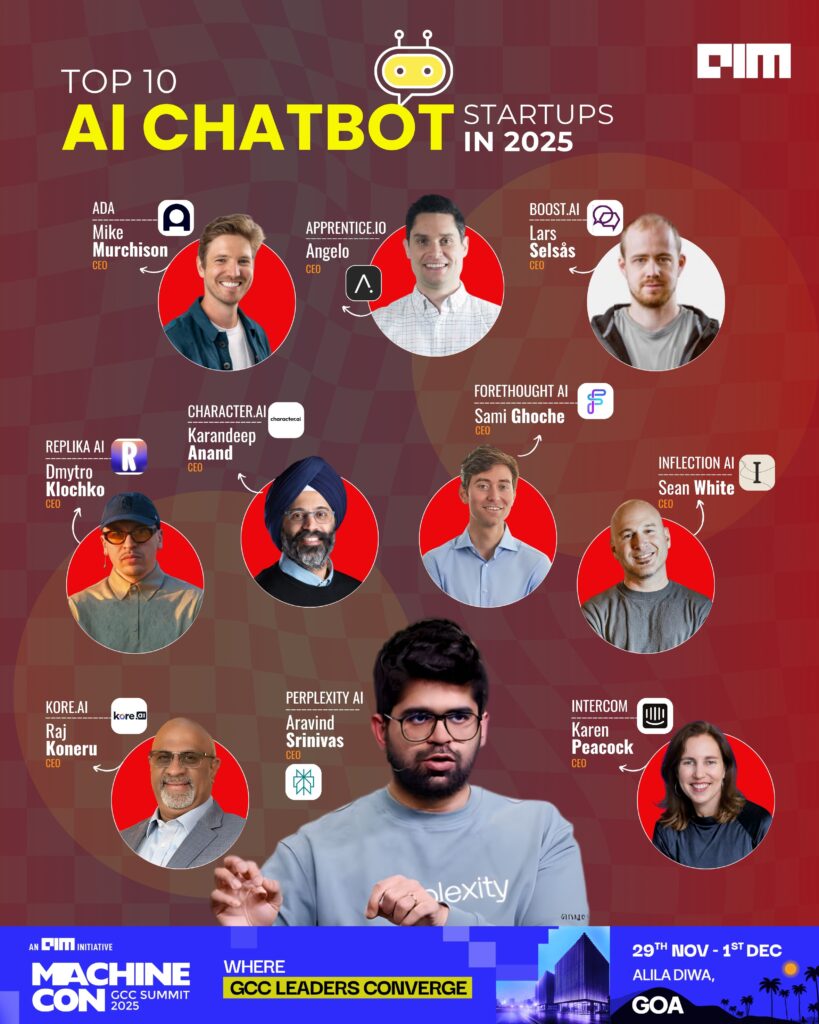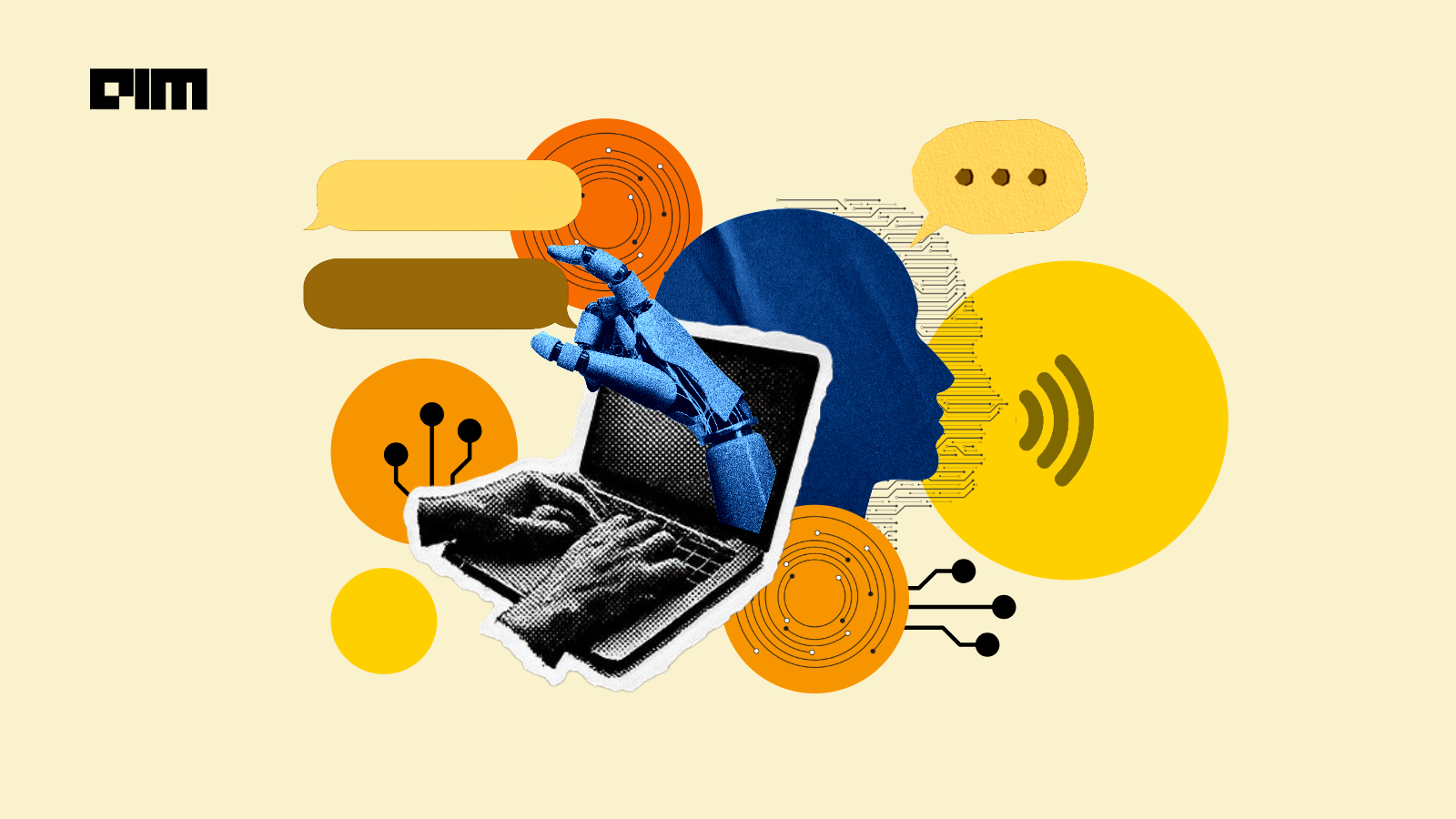Remember when chatbots were those clunky, robotic assistants that barely understood a word you said and routinely gave answers that made you more confused? Well, those days are long behind us.
In 2025, AI chatbots have evolved into sophisticated, witty conversational partners who don’t just follow scripts, they understand context, crack jokes, and can even book your flights. They’re becoming essential digital companions, capable of multitasking at scale.
Today’s AI chatbots combine advanced natural language processing with real-time data and emotional intelligence to create interactions that feel remarkably human, personalized, and efficient. Whether assisting customers, optimizing workflows, or offering companionship, these chatbots are making technology more accessible and less robotic.

1. Perplexity AI
Founded in 2022 by Aravind Srinivas, Denis Yarats, Johnny Ho, and Andy Konwinski, Perplexity AI is changing how people find and interact with information online by combining the power of AI with real-time web search. Positioned as the “ChatGPT for the open web,” Perplexity blends advanced language understanding with real-time web data retrieval to deliver fact-based, cited responses instantly.
This approach challenges traditional keyword search by providing transparent, multi-turn conversational answers. Key features include a Deep Research mode that autonomously performs expert-level analysis by conducting extensive searches and compiling comprehensive reports, saving users hours of manual research.
Perplexity also offers the Comet AI browser, which integrates the chatbot’s capabilities directly into web browsing, enabling tasks like summarizing pages, composing emails, and describing images. Supported by top investors like IVP, Jeff Bezos, and Nvidia, the startup has reached a valuation of $20 billion as of mid-2025 and continues to expand its offerings and user base.
2. Character.AI
Character.AI creates AI chatbots that simulate human personalities at scale. Founded in 2021 by Noam Shazeer and Daniel De Freitas, their platform allows users to engage with, customize, and build AI companions ranging from famous historical figures to fictional characters. Character.AI is known for its highly interactive and engaging chatbot experience, which has gained over 20 million active users worldwide.
Its users generate approximately 180 million monthly visits on the platform, spending an average of 12 to 17 minutes per session while interacting with nearly 9 pages per visit. The startup is backed by Andreessen Horowitz and recently named Karandeep Anand as CEO to scale the platform further. Its user base primarily consists of young adults, including significant traction among the Gen Z population.
3. Inflection AI
Founded by DeepMind co-founder Mustafa Suleyman, and LinkedIn co-founder Reid Hoffman, Inflection AI focuses on developing emotionally intelligent chatbots designed as personal companions.
Its flagship personal assistant chatbot, Pi, is designed for empathy, contextual understanding, and natural interactions, catering to users desiring more “human-first” AI conversations. Pi is powered by Inflection’s proprietary large language model, Inflection 2.5, which is optimized for efficient computation and human-like interactions.
It supports rich, multi-turn dialogue that can provide emotional support, offer helpful advice, engage in casual chat, or assist with knowledge discovery. With over $1.5 billion in funding from Microsoft and Nvidia, Inflection AI aims to redefine how AI supports personal wellbeing and productivity.
4. Forethought AI
Founded in 2017 by Deon Nicholas and Sami Ghoche, Forethought AI specializes in providing enterprise-grade AI chatbots for customer support. Its AI assistant, Agatha, automates complex customer interactions by learning from past support tickets to generate real-time, contextual replies and resolutions.
This shifts customer service from reactive problem-solving to proactive engagement. Forethought’s enterprise clients include Instacart, Dropbox, and Carta, reflecting its growing footprint in SaaS and tech industries. Agatha integrates seamlessly with help desk platforms like Zendesk, Salesforce, and Freshdesk, enabling omnichannel and multi-agent collaboration.
Key features include intelligent ticket triage and classification, personalized AI-driven responses, and agent-assist workflows that provide human customer service representatives with real-time suggestions and next-step guidance.
5. Kore.ai
Specializing in omnichannel conversational AI, Kore.ai offers scalable chatbots focused on business automation across industries including banking, healthcare, and telecom. Founded in 2014 by Raj Koneru, their XO platform integrates voice, chat, and email interfaces, providing enterprises with flexible, secure, and intelligent AI-driven conversation tools.
The XO Platform is recognized for its sophisticated natural language processing (NLP) capabilities that accurately interpret user intent and sustain multi-turn, context-aware conversations, delivering personalized and relevant responses.
A standout feature of the XO platform is its ease of use, featuring low-code and no-code development environments that empower both technical and non-technical users to craft and manage AI bots efficiently. Kore.ai supports over 200 Fortune 2000 companies in digital transformation through intelligent virtual assistants.
6. Replika.ai
Replika AI stands out as a key player in AI companionship, offering emotionally intelligent chatbots that imitate natural human relationships. Founded in 2017 by Eugenia Kuyda, Replika AI has garnered over 10 million users worldwide who use its AI for daily conversations, mental health support, and even in voice and virtual reality environments.
Beyond chatting, Replika offers mood tracking, mindfulness exercises, journaling prompts, and role-playing activities, aiming to support users’ personal growth. Its customizable relationship modes include friend, partner, and mentor settings, adjusting the chatbot’s tone and behavior accordingly. While free access offers core functionalities, Replika Pro unlocks enhanced features such as voice calls, romantic roleplay, interactive stories, and augmented reality experiences.
7. Ada
Founded in 2016 by Mike Murchison and David Hariri, Ada is a no-code chatbot platform that streamlines customer support automation for industries like retail, finance, and telecom. Ada’s proprietary Reasoning Engine intelligently interprets user intent and context, allowing it to handle complex queries beyond simple keyword matching.
Ada excels at automating responses to common customer questions, reducing call center loads by providing instant, accurate answers while freeing human agents to tackle more nuanced problems. Its no-code, drag-and-drop bot builder empowers business users to design and deploy chatbots without heavy developer involvement, making it easier to launch and maintain conversational workflows.
With robust integration capabilities, Ada connects seamlessly to major CRMs and third-party platforms such as Salesforce, Zendesk, Shopify, and Gorgias, enabling dynamic data retrieval and action execution within conversations. Ada is recognized for its enterprise-grade security and compliance, including SOC 2 and GDPR certifications.
8. Intercom
Intercom is a versatile platform combining live chat, AI chatbots, and customer engagement automation. Its AI assistant, Fin, is known for automating routine queries and seamlessly escalating conversations to human agents when needed. Founded in 2011 by Eoghan McCabe, Des Traynor, Ciaran Lee, and David Barrett, its AI agent integrates deeply with the company’s Helpdesk system, enabling support teams to deliver faster, more consistent, and personalized customer experiences at scale.
Supported by significant funding from top-tier venture capital firms such as Kleiner Perkins, Bessemer Venture Partners, and Social Capital, Intercom has raised over $1.3 billion since its inception. It employs between 1,001 and 5,000 people globally and serves more than 25,000 organizations including Microsoft, Shopify, and Atlassian.
9. Boost.ai
Founded in 2016 by Lars Selsås and Henry Vaage Iversen, Boost.ai builds scalable, domain-specific chatbots serving the financial, insurance, and public sectors. With a focus on high compliance and reliability, Boost.ai’s virtual agents handle hundreds of customer queries per second for clients like Nordea, Telenor, and Santander.
With over 600 live AI agents and more than 150 million automated conversations annually, Boost.ai solutions help enterprises deliver efficient self-service experiences that reduce costs and increase customer satisfaction. Its AI-powered voice agents provide real-time transcription, speech-to-text tuning, natural background audio, and deep analytics to ensure human-like interactions.
Recognized by Gartner as a Leader in Conversational AI Platforms for 2025, Boost.ai emphasizes trust, security, and compliance, offering SOC 2 and GDPR certifications that cater to high-security environments.
10. Apprentice.ai
Founded by Angelo Stracquatanio, Apprentice.io specializes in AI chatbots designed to assist workforce training and support in manufacturing, biotech, and pharmaceutical sectors. Their patented “AI co-pilot” helps workers navigate complex procedures, answers real-time queries, and ensures regulatory compliance, enhancing operational safety and quality.
The company combines augmented reality (AR), computer vision, and machine learning to deliver AI-driven virtual assistants that guide employees through complex operational procedures while ensuring compliance with stringent industry regulations.
Their solutions not only accelerate drug production and biotech workflows but also reduce costs, increase throughput, and enhance operational safety. Backed by over $350M in funding led by Insight Partners and Silver Lake, Apprentice.io is a pioneer in merging conversational AI with industrial digital workflows.










